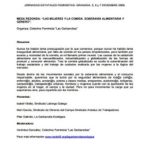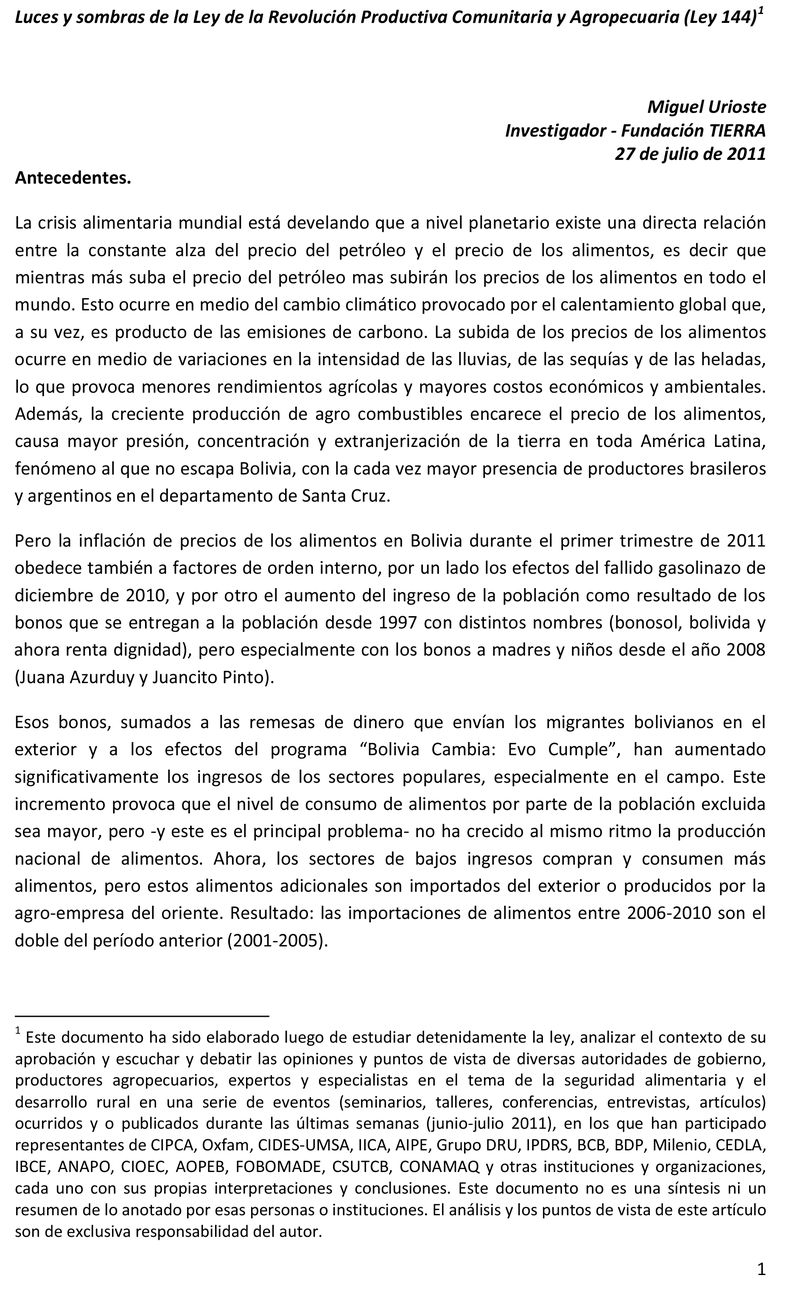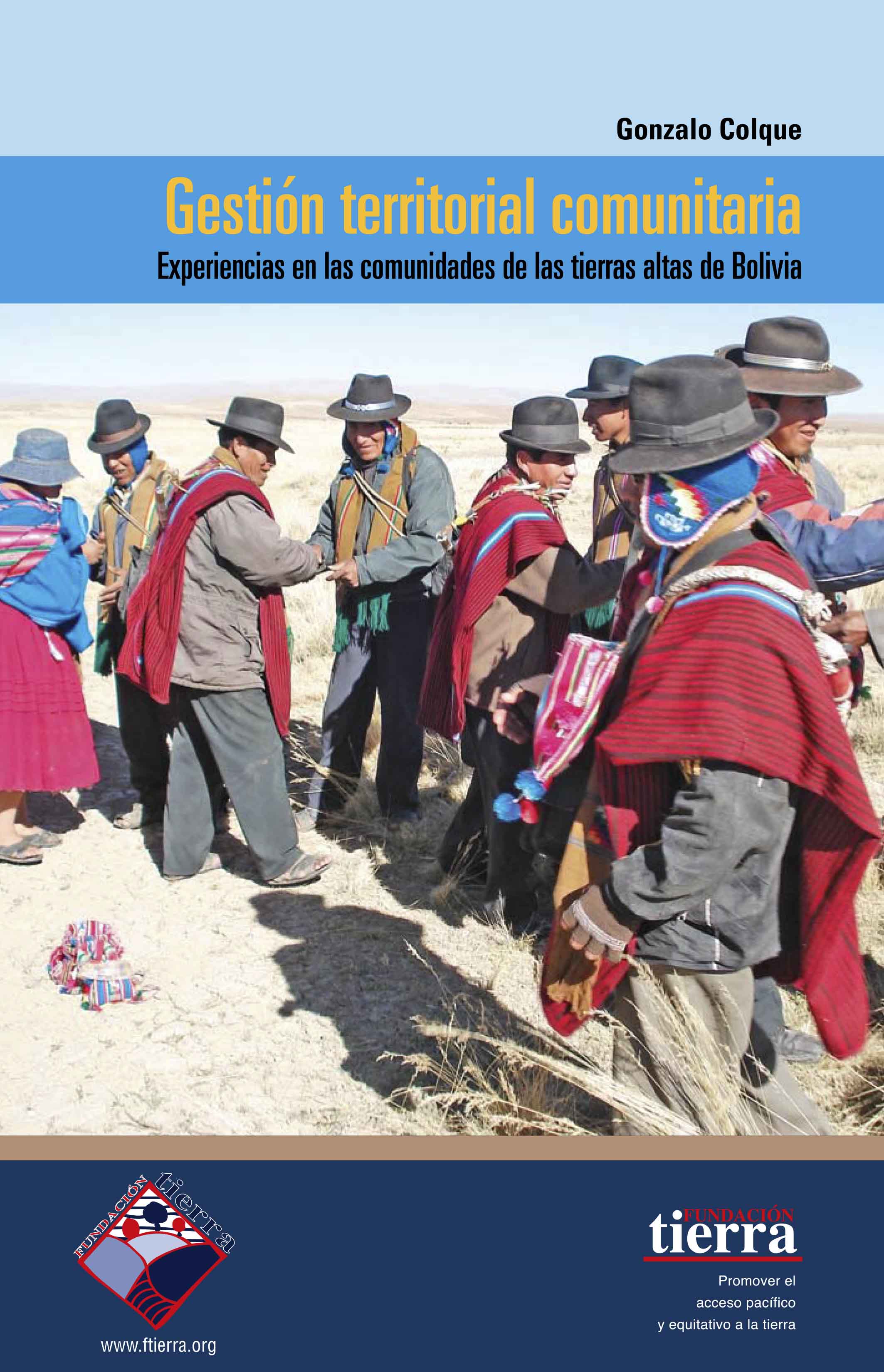Location
TIERRA es una organización no gubernamental boliviana. Busca ideas y propuestas para el desarrollo rural sostenible de la población indígena, originaria y campesina. Impulsa el acceso equitativo y el uso sostenible de los recursos naturales, especialmente de la tierra y el territorio.
TIERRA adopta la investigación – acción, como una forma de trabajo para establecer una comunidad amplia de investigadores agraristas y ruralistas, promotores del desarrollo rural, facilitadores comunitarios, activistas y líderes de las comunidades. Construye capacidades de gestión, negociación y participación de las organizaciones indígenas, originarias y campesinas.
TIERRA trabaja en cinco ejes temáticos: Seguridad alimentaria con soberanía, Transformaciones agrarias y rurales; Reforma agraria y titulación de tierras, Acceso de las mujeres rurales a la tierra y Pueblos y autonomías indígenas.
Members:
Resources
Displaying 31 - 34 of 34Las mujeres y el acceso a la tierra comunal en América Latina
El artículo se refiere a los derechos a la tierra por parte de las mujeres en los territorios comunales. Luego de hacer una reflexión regional sobre la estructura de la tenencia de tierra en América Latina, la autora realiza un análisis comparativo entre Bolivia y Guatemala. En ambos casos, analiza cómo han cambiado prácticas y normas legales y tradicionales, cómo dialogan entre sí, pero también cómo han impactado en los derechos de las mujeres en tierras comunales.
Luces y sombras de la Ley de la Revolución Productiva Comunitaria y Agropecuaria (Ley 144)
Este documento ha sido elaborado luego de estudiar detenidamente la ley, analizar el contexto de su aprobación y escuchar y debatir las opiniones y puntos de vista de diversas authoridades de gobierno, productores agropecuarios, expertos y especialistas en el tema de la seguridad alimentaria y el desarrollo rural en una serie de eventos (seminarios, talleres, conferencias, entrevistas, artículos) ocurridos y o publicados durante las últimas semanas (junio-julio 2011), en los que han participado representantes de CIPCA, Oxfam, CIDES-UMSA, IICA, AIPE, Grupo DRU, IPDRS, BCB, BDP, Milenio, CEDL
Gestión Territorial Comunitaria, experiencias en las comunidades de las tierras altas de Bolivia
Este texto muestra cómo las comunidades de hoy están ante el desafío de emprender un papel protagónico en la constitución del Estado nacional y de su propio desarrollo con las autonomías indígenas originarias campesinas y para ello están poniendo en práctica sus mecanismos de resolución de conflictos, normas e instituciones para, de esta manera, esclarecer y consolidar sus derechos de propiedad sobre la tierra.
Swedwatch 2020-2023 - Swedwatch 2020-2023 GLOBen, new strategy 2022
General
Despite a clear trend toward sustainability within the private and public sector, many challenges remain with regards to production, land rights, labor rights and environmental pollution and climate. Swedwatch is an organisation which through research and multistake-holder dialogue works for a normative change within business to reduce its negative consequences and to align it better with social, economic and environmental goals. Through a core support of 53,9 MSEK Sida is supporting Swedwatch's work for sustainable business and its contribution to the normative discussions on a global level. Through its sector-specific and thematic research, Swedwatch seeks to contribute to 1. Responsible and equitable management and use of natural resources 2. Sustainable and fair global supply chains: global supply chains for production of goods and services are increasingly sustainable, fair and transparent 3. Empowered rights holders and expanded civic space: civil society within the area of business, human rights and environment is increasingly informed and active In order to do this, Swedwatch has a clear emphasis on rights-holders where they cooperate with local groups and indigenous people in order to make their voices heard. Swedwatch also engages in dialogue with corporations to influence them and to jointly create positive examples of sustainable business, for example by encouraging human rights due diligence. Swedwatch works for public procurement to increasingly emphasize issues of sustainability. Swedwatch use their research to influence and challenge business in a variety of networks, such as the United Nations Economic and Social Council, the EU and OECD.
Objectives
Swedwatch's vision is a world in which economic systems are just, transparent and sustainable. Human rights and the environment are protected and respected and businesses contribute to sustainable development and inclusive growth within the means of the planet. Swedwatch aims to contribute to the empowerment of rights holders and will promote responsible business practices that respect human rights and the environment. Through research, investigations and multi-stakeholder dialogue Swedwatch aims to contribute to behavioural changes of business actors, public actors and civil society actors in order to safeguard human rights and environmental sustainability. To this end, Swedwatch's strategy has three main objectives: 1. Responsible and equitable management and use of natural resources 2. Sustainable and fair global supply chains 3. Empowered rights holders and expanded civic space





